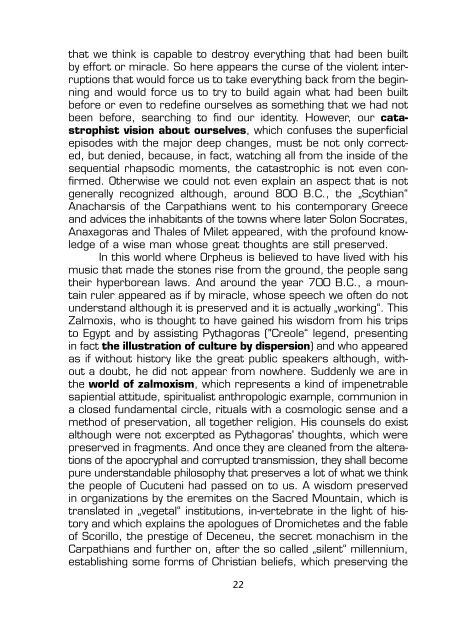genius loci pt. pdf.qxd - ROMANIAN LIBRARY
genius loci pt. pdf.qxd - ROMANIAN LIBRARY
genius loci pt. pdf.qxd - ROMANIAN LIBRARY
You also want an ePaper? Increase the reach of your titles
YUMPU automatically turns print PDFs into web optimized ePapers that Google loves.
that we think is capable to destroy everything that had been built<br />
by effort or miracle. So here appears the curse of the violent interru<strong>pt</strong>ions<br />
that would force us to take everything back from the beginning<br />
and would force us to try to build again what had been built<br />
before or even to redefine ourselves as something that we had not<br />
been before, searching to find our identity. However, our catastrophist<br />
vision about ourselves, which confuses the superficial<br />
episodes with the major deep changes, must be not only corrected,<br />
but denied, because, in fact, watching all from the inside of the<br />
sequential rhapsodic moments, the catastrophic is not even confirmed.<br />
Otherwise we could not even explain an aspect that is not<br />
generally recognized although, around 800 B.C., the „Scythian“<br />
Anacharsis of the Carpathians went to his contemporary Greece<br />
and advices the inhabitants of the towns where later Solon Socrates,<br />
Anaxagoras and Thales of Milet appeared, with the profound knowledge<br />
of a wise man whose great thoughts are still preserved.<br />
In this world where Orpheus is believed to have lived with his<br />
music that made the stones rise from the ground, the people sang<br />
their hyperborean laws. And around the year 700 B.C., a mountain<br />
ruler appeared as if by miracle, whose speech we often do not<br />
understand although it is preserved and it is actually „working“. This<br />
Zalmoxis, who is thought to have gained his wisdom from his trips<br />
to Egy<strong>pt</strong> and by assisting Pythagoras ("Creole“ legend, presenting<br />
in fact the illustration of culture by dispersion) and who appeared<br />
as if without history like the great public speakers although, without<br />
a doubt, he did not appear from nowhere. Suddenly we are in<br />
the world of zalmoxism, which represents a kind of impenetrable<br />
sapiential attitude, spiritualist anthropologic example, communion in<br />
a closed fundamental circle, rituals with a cosmologic sense and a<br />
method of preservation, all together religion. His counsels do exist<br />
although were not excer<strong>pt</strong>ed as Pythagoras' thoughts, which were<br />
preserved in fragments. And once they are cleaned from the alterations<br />
of the apocryphal and corru<strong>pt</strong>ed transmission, they shall become<br />
pure understandable philosophy that preserves a lot of what we think<br />
the people of Cucuteni had passed on to us. A wisdom preserved<br />
in organizations by the eremites on the Sacred Mountain, which is<br />
translated in „vegetal“ institutions, in-vertebrate in the light of history<br />
and which explains the apologues of Dromichetes and the fable<br />
of Scorillo, the prestige of Deceneu, the secret monachism in the<br />
Carpathians and further on, after the so called „silent“ millennium,<br />
establishing some forms of Christian beliefs, which preserving the<br />
22



